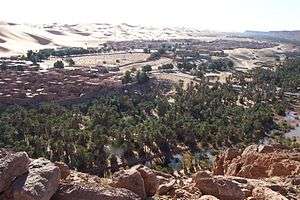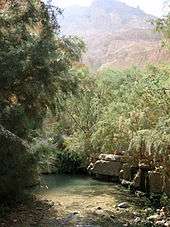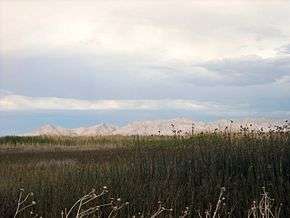Oasis

In geography, an oasis (plural: oases) is an isolated area of vegetation in a desert, typically surrounding a spring or similar water source, such as a pond or small lake. Oases also provide habitat for animals and even humans if the area is big enough. The location of oases has been of critical importance for trade and transportation routes in desert areas; caravans must travel via oases so that supplies of water and food can be replenished. Thus, political or military control of an oasis has in many cases meant control of trade on a particular route. For example, the oases of Awjila, Ghadames, and Kufra, situated in modern-day Libya, have at various times been vital to both North-South and East-West trade in the Sahara Desert.
Oases are formed from underground rivers or aquifers such as an artesian aquifer, where water can reach the surface naturally by pressure or by man-made wells. Occasional brief thunderstorms provide subterranean water to sustain natural oases, such as the Tuat. Substrata of impermeable rock and stone can trap water and retain it in pockets, or on long faulting subsurface ridges or volcanic dikes water can collect and percolate to the surface. Any incidence of water is then used by migrating birds, which also pass seeds with their droppings which will grow at the water's edge forming an oasis. It can also be used to plant crops.
Etymology
The word oasis came into English via Latin: oasis from Ancient Greek: ὄασις óasis, which in turn is a direct borrowing from Demotic Egyptian. The word for oasis in the later attested Coptic language (the descendant of Demotic Egyptian) is wahe or ouahe which means a "dwelling place".[1]
Growing plants
People who live in an oasis must manage land and water use carefully; fields must be irrigated to grow plants like apricots, dates, figs, and olives. The most important plant in an oasis is the date palm, which forms the upper layer. These palm trees provide shade for smaller trees like peach trees, which form the middle layer. By growing plants in different layers, the farmers make best use of the soil and water. Many vegetables are also grown and some cereals, such as barley, millet, and wheat, are grown where there is more moisture.[2]
See also
- Great Man-Made River – the world's largest irrigation project; developed in Libya to connect cities with fossil water.
- Guelta
- Mirage
- Oasification
- Qanat
- Wadi
- Water supply
References
- ↑ Douglas Harper. "Etymonline - Origin of 'Oasis'". Online Etymology Dictionary. Retrieved 2011-07-30.
- ↑ Encyclopedia Britannica Online.
Bibliography
- (French) référence: Jardins au désert (Vincent Battesti)|Battesti (Vincent), Jardins au désert, Evolution des pratiques et savoirs oasiens, Jérid tunisien, Paris, Éditions IRD, coll. À travers champs, 2005, 440 p. ISBN 2-7099-1564-2 Open Archives: book in free access / in French
External links
| Wikimedia Commons has media related to: |
-
 The dictionary definition of oasis at Wiktionary
The dictionary definition of oasis at Wiktionary


